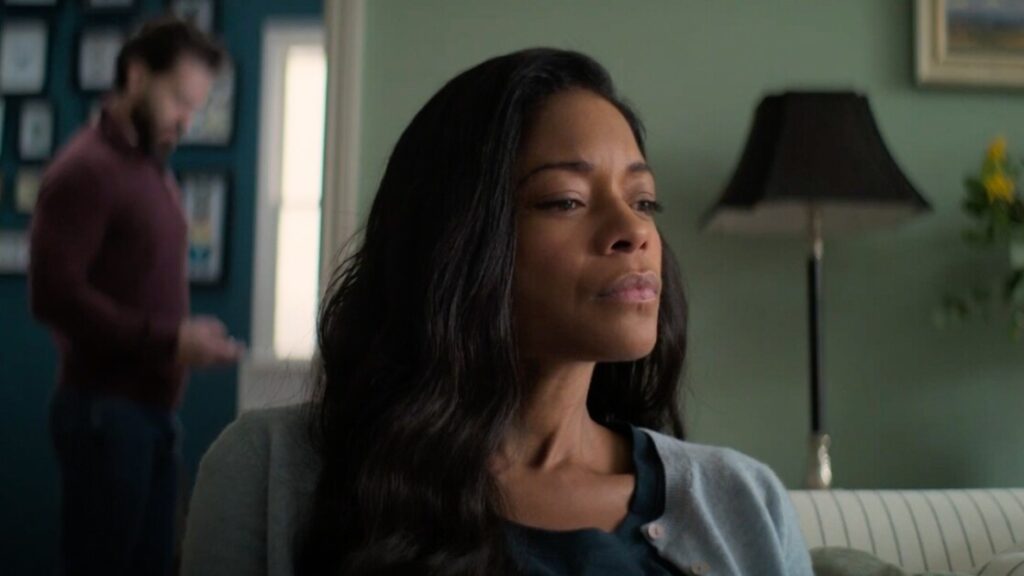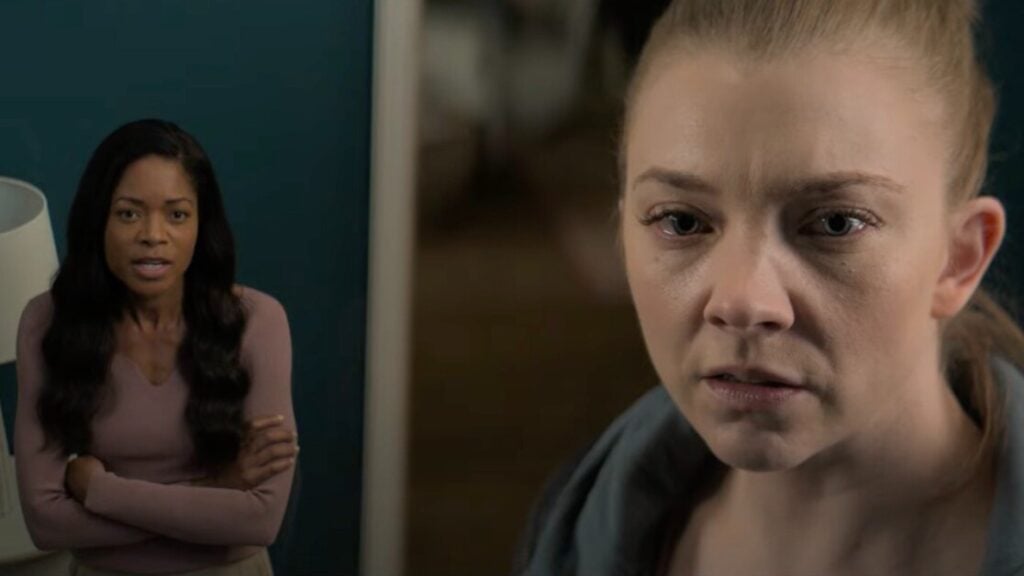Nothing is more satisfying than a head-twisting turn in what you thought was a predictable movie. Just when you think you have everything figured out, another plotline, secret or character is thrown into the mix, hopefully derailing the movie in a good way. Director Guillem Morales (Julia’s Eyes, The Uninvited Guest) knows that like no other as his latest feature, The Wasp, is filled with secretive twists and turns and two tour-de-force performances by Naomie Harris (Black and Blue, The Man Who Fell To Earth) and Natalie Dormer (Game of Thrones, Penny Dreadful: City of Angels).
The movie’s premise, based on Morgan Lloyd Malcolm’s play of the same name, is relatively simple. An unhappy homemaker named Heather (Harris) contacts her high school friend Carla (Dormer) to kill her domineering husband, Simon (Dominic Allburn), for a grand sum of £50,000. That is pretty much the first half of this feature. The beginning is mainly about Heather finally making the decision to murder her abusive husband and contacting Carla, which results in the first half feeling a bit flat and monotonous. The first forty-five minutes are mundane, especially compared to what you will see next, and a few plotlines occur at the beginning that will sadly be proven to be either unresolved or unnecessary.
However, once the ladies start planning their murderous complot, The Wasp finds its pace and darkness. Nothing and no one is what and who they seem to be. At first, you wonder why Heather has hired her pregnant long-lost friend, who’s not a killer, to end her husband’s life. Also, why is Carla risking her life for this now that she’s about to give birth again? Is it for the handsome payoff, or is there much more for her?

Patience is a virtue and a necessity when watching this feature. Heather wants to kill Simon, and why she knocks on Carla’s door is much more complex than initially thought. Carla has some dark secrets of her own, which come bubbling slowly through the surface. You get a glimpse into both women’s secretive past via intricate flashbacks, which break through the first act’s monotony. It’s then that the movie gets more personality and complexity than initially expected.
Morales combines a high level of suspense, not-so-cheap thrills, and mysteries compellingly. This results in a dark character study that explores childhood trauma, the impact of abuse, and dealing with mental illnesses, and a movie that pulls you in many dark directions. One moment, you’ll root for one character, while a few scenes later, you feel sympathy for the other. According to Harris and Dormer, these shifts in sympathy are the strengths of this suspenseful project, and we agree with them.
Speaking of the two leading ladies, they both deliver powerful performances. With a murderous movie like this, it’s easy to go too far to create an over-the-top slasher or to not push the boundaries and make a psychological thriller that needs to dig deeper into the psyche. Morales and his cast find the right balance between the blood and psychological element. This is done by including compelling symbolism – even during the daring third act – and two balanced and cleverly executed performances.
Despite the movie being about a murder, there’s not much violence or physical action. It mainly consists of Heather and Carla conversing and plotting their scheme. This results in long – sometimes extremely long – conversations, but those never get tiring because of the unpredictability of the feature and the boldness of the performances. Harris shows weakness and ferocity in her character through her mesmerizing and commanding acting. At the same time, Dormer ensures with a thought-provoking performance that her character is much more multi-layered and less clichéd than Carla’s looks make you believe.

It’s no wonder, though, that this movie is dialogue-heavy as it’s based on a play, after all. Adapting a play into a film is challenging as the conversation could be unnecessarily dragging, making it feel like an uninteresting watch. However, Morales pulls off this assignment in a seamless way. The close-ups and the tight framing by cinematographer John Sorapure (Ted Lasso, Click & Collect) make the audience feel Heather’s trapped situation and the walls closing in on both ladies. Together with the disturbing flashbacks, the unsettling camerawork creates a frightening atmosphere.
The symbolism we have already touched on is an aspect the director and writer are keen on. As a title, The Wasp fits many events occurring in this feature. Sometimes, its meaning is very much on the nose. For example, Heather has to deal with a massive wasp infestation in her house, but sometimes the meaning is much more complex. It can also refer to the stinging, backstabbing, and painful behavior of the three characters.
While the first half of The Wasp is underwhelming, the splendid performances and the explosive final act rise to the occasion. This results in an absurd yet well-orchestrated and twisted psycho-thriller.
The Wasp is now playing exclusively in cinemas courtesy of Shout! Studios.







